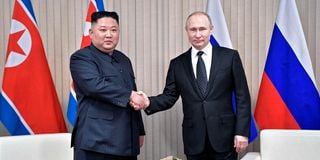Premium
In Russia, North Korea finds escape it wouldn’t in Africa

North Korean leader Kim Jong Un (left) with Russian President Vladimir Putin.
What you need to know:
- Banned from the global financial system, North Korea had in the past used art and culture to earn revenue.
- Moscow said it opposes the militarisation of its neighbourhood including in the Korean peninsula.
North Korea hardly makes news in Africa, except when it announces the closure of embassies due to financial constraints or launches a ballistic missile to test its capabilities.
This week, something happened: Pyongyang ratified the Treaty on Strategic Partnership with Moscow, buoying its defence collaborations with Russia.
State publications there said the treaty of “friendship, good neighbourliness and cooperation” will be a “powerful security device that eases regional situation and guarantees international stability” they say will be multi-polar and without domination or subjugation.
That treaty publication came after a series of moves between North Korea and Russia, which had seen Pyongyang deploy troops to Russia to help support the war against Ukraine.
However, it also offered a window of escape for North Korea, which had used all manner of tools in the past to dodge the wall of sanctions imposed on Pyongyang.
Banned from the global financial system, North Korea had in the past used art and culture to earn revenue. In Senegal, for example, they put up a monument outside Dakar, at a fee. In Uganda, they had helped train martial arts to Ugandan soldiers, a controversial programme which saw Kampala terminate under pressure from the US.
Otherwise, North Korean diplomats had in the past been implicated in illegal stuff such as poaching and trafficking to survive. Some experts said these activities were state-sanctioned, allowing officials to cover their tracks with diplomatic privileges in places where they worked.
Yonghwan Park, a senior researcher at the Korean Institute of Defence argued the new cooperation between North Korea and Russia could solidify “a confrontational structure” among North Korea, China, Russia on one side and South Korea, the US, and Japan on the other.
“This is a strategy intended by North Korea. This is because it can ultimately work to the advantage of the vulnerable Kim Jong-un regime and the North system,” he argued in a commentary this week.
“The confrontation between the camps increases North Korea’s value to China and Russia, and encourages them to support the regime and system to continue. In particular, Russia’s support for North Korea can lead to closer ties between North Korea and Russia, and hinder efforts to weaken sanctions against North Korea and denuclearize North Korea.”
When the war in Ukraine escalated, North Korea saw an opportunity. But it was also a chance for Moscow to twist its knife on the West. First, Russia vetoed a draft resolution at the UN Security Council, ending the mandate of a UN sanctions team.
Since then, the Multilateral Sanctions Monitoring Team has been established by the US, South Korea and Japan and nine other countries.
Moscow argued this circumvents the role of the UN Security Council to monitor sanctions against the Democratic People’s Republic of Korea (the official name of North Korea) and that “aggravates tensions and create additional threats to regional security.” Moscow originally opposed the sanctions on North Korea, arguing they had become a tool by the West.
Maria Zakharova, the spokesperson of the Russian Foreign Ministry said cooperation with North Korea shouldn’t worry anyone “committed to promoting mutually beneficial peaceful cooperation with Russia.”
She argued the West was demonising her country.
For North Korea, however, this is a chance to enhance its relevance. Joohyun Moon, Prof of Energy Engineering, Dankook University in South Korea, argued North Korea’s troop deployment to Russia appears to be driven by several strategic motives, with the primary goal of solidifying its alliance with Moscow.
“This alliance extends beyond mere diplomatic formalities; North Korea seems to believe that a 'blood alliance' forged on the battlefield will better secure its future. Kim Jong-un’s administration likely believes that only deep ties with powerful nations like Russia can preserve its regime,” he said at a webinar this week.
Russia, he argued, possesses critical technologies in re-entry capabilities for intercontinental ballistic missiles, reconnaissance satellites, and nuclear-powered submarines—all elements North Korea seeks to bolster its military power.
Possessing such technology would enable North Korea to pose a greater threat not only to South Korea but also to other neighbouring countries and even the US, further destabilising the already fragile security landscape in the region.
North Korea’s economy has long struggled under international sanctions, and though this deployment may offer some financial relief, these gains come at a tragic cost.
But Russia, having been sanctioned by the West after the war in Ukraine started, has learnt the ropes of beating the blockade.
In North Korea, it found a country in need, and which could support its cause. Officially, Moscow said it opposes the militarisation of its neighbourhood including in the Korean peninsula, and the “creeping expansion” of NATO into Southeast Asia.
Jun Kyu Park, a Representative of the Korea Young Leaders Forum says North Korea has already manipulated the public to ensure troop deployment doesn’t cause domestic friction.
“Those who defy the regime or attempt to escape are indiscriminately eliminated, with the distribution of survival resources such as food being determined and applied based on their loyalty to the central party as defined by the ruling authority.”





